- Home
- Media Kit
- MediaJet
- Current Issue
- Past Issues
- Ad Specs-Submission
- Ad Print Settings
- Reprints (PDF)
- Photo Specifications (PDF)
- Contact Us
- PRIVACY POLICY
- TERMS OF USE
![]()
ONLINE
![]()
ONLINE

Sports and Family
Editors’ Note
The steady upward trajectory that the UConn men’s basketball program had maintained during Dan Hurley’s first four years as head coach took a monumental leap in 2023 as Hurley guided the Huskies to the fifth NCAA National Championship in program history. The national crown was the product of a rebuilding job that Hurley began when he took the reins of a struggling UConn program in March 2018, as the 19th head coach in UConn history. The Huskies’ winning percentage has improved in each season under Hurley.
Although Hurley was a national recruit coming out of St. Anthony High School and he put together an impressive college playing career at Seton Hall, it is as a coach that Hurley has made the basketball world take notice, as a program-builder and a positive guiding force for young men. While still a youthful coach in college basketball terms, Hurley has already taken charge of four struggling hoop programs – St. Benedict’s Prep, Wagner College, the University of Rhode Island, and UConn – and built them into competitors on the national stage.
Hurley is a product of one of the most well-known basketball families in the country, led by his father, Bob Sr., a Naismith Memorial Basketball Hall of Fame inductee following a legendary high school coaching career at powerhouse St. Anthony in Jersey City (New Jersey), and including older brother Bobby, a college All-American and two-time National Champion player at Duke, who played for five years in the NBA, and is currently the head coach at Arizona State.
Hurley came to UConn following six years at Rhode Island, where he took a program that went 7-23 in the season before he arrived to a combined 51-18 mark and two NCAA Tournament appearances in his final two years, URI’s first NCAA appearances in 18 years. In each year, Hurley guided the Rams to a first-round NCAA tourney victory. In 2014-15, Hurley earned his first U.S.BWA District I Coach of the Year Award and in 2017-18, Hurley was named Atlantic 10 Coach of the Year, earned his second U.S. BWA District I Coach of the Year Award and sent two of his players to NBA teams. Prior to his tenure at Rhode Island, Hurley spent two years at his first Division I head coaching job at Wagner College in the Northeast Conference.
After graduating from Seton Hall in 1996 and spending a season as an assistant coach under his father at St. Anthony, Hurley was hired as an assistant coach at Rutgers and remained there for four years. When Rutgers decided to change coaching staffs, Hurley opted to go back to the high school level and took over the basketball program at St. Benedict’s Prep in Newark, New Jersey, in 2001. It was at St. Benedict’s, where he also taught history, that Hurley maintains he really learned his craft, building the program into a national prep school powerhouse. In nine seasons, Hurley compiled a sterling 223-21 record, with four Top Five finishes in the national rankings. He coached four McDonald’s All-Americans as well as future NBA players J.R. Smith, Tristan Thompson, and Lance Thomas.
Born and raised in Jersey City, Hurley was an outstanding high school player at St. Anthony, leading the team to a 31-1 record and a #2 national ranking as a senior. At Seton Hall, he played under head coaches P.J. Carlesimo and George Blaney, amassing career totals of 1,070 points and 437 assists and helped the Pirates to three NCAA Tournament appearances and an NIT berth during his career.
Hurley and wife, Andrea, who met while both were attending Seton Hall, are the parents of two sons, Danny, also a Seton Hall graduate, and Andrew, a junior at UConn.
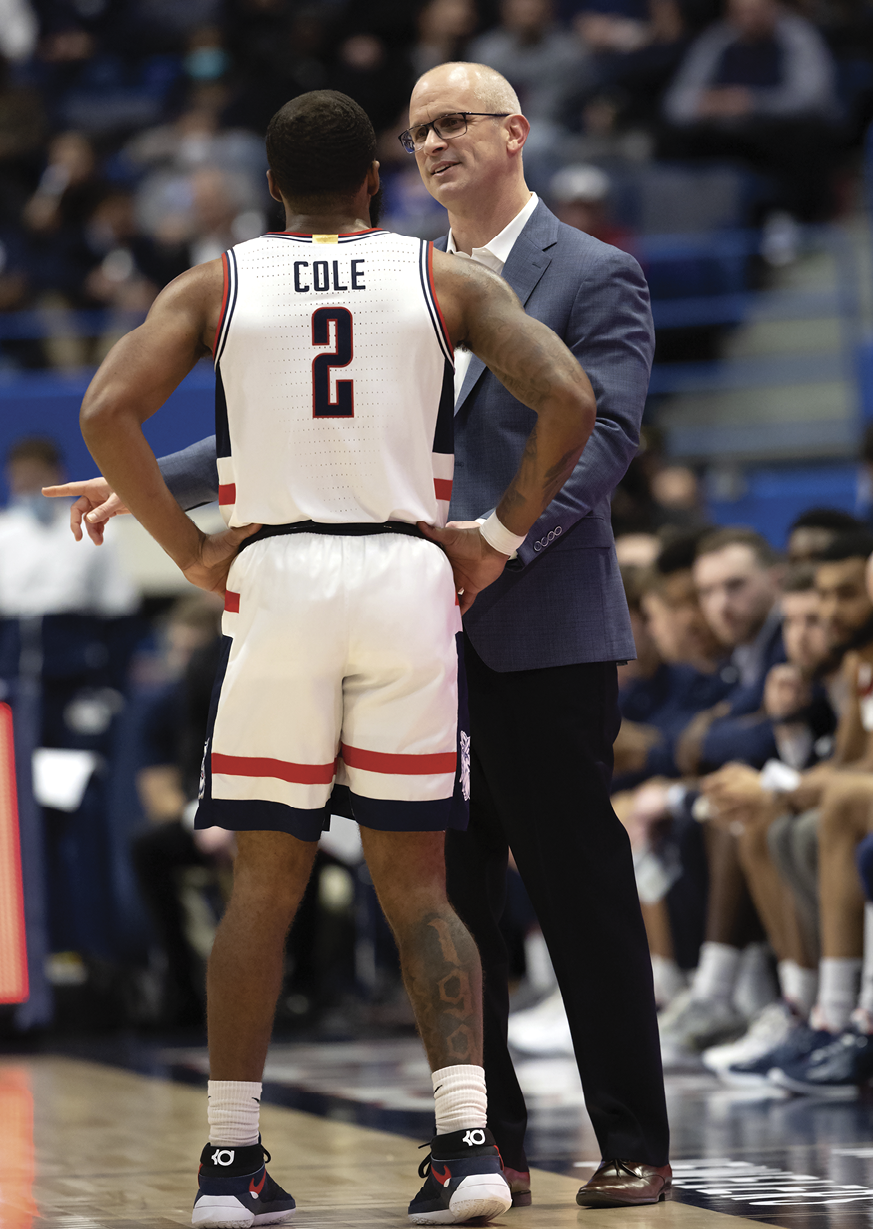
Dan Hurley coaching the UConn men’s basketball team
Having grown up in a basketball family, did you always know that this was the career path you wanted to pursue?
I could not imagine a life without sports. Our dad exposed us in Jersey City where we grew up with all types of sports, from Little League baseball to football, basketball, track – we were always very active. The competitive fire was developed at a very young age by being involved in so many different sports, and then as you get older you start to narrow your focus. As we approached high school, we knew that it was necessary to commit to basketball to be able to play at a high level and to be able to get a college scholarship. My brother and I knew that the only way we were going to be able to go away to college was if we got a college scholarship. Once basketball became the central figure in our lives during our high school days, I knew that I was going to either play and then coach, or coach straight away.
It has not always been a smooth journey. How important has it been to have resilience as you have navigated your career?
I think that most successful people have experienced a lot of setbacks and losses along the way, and this builds up a resiliency and a toughness which is necessary to learn and grow from the mistakes. I have always had self-awareness, especially as I got into coaching. While I feel that my playing career gave me a good understanding of the game, I realized when I entered coaching that year after year I needed to get better to develop and evolve as a coach. Unfortunately, sometimes the best way to get better is to fail.
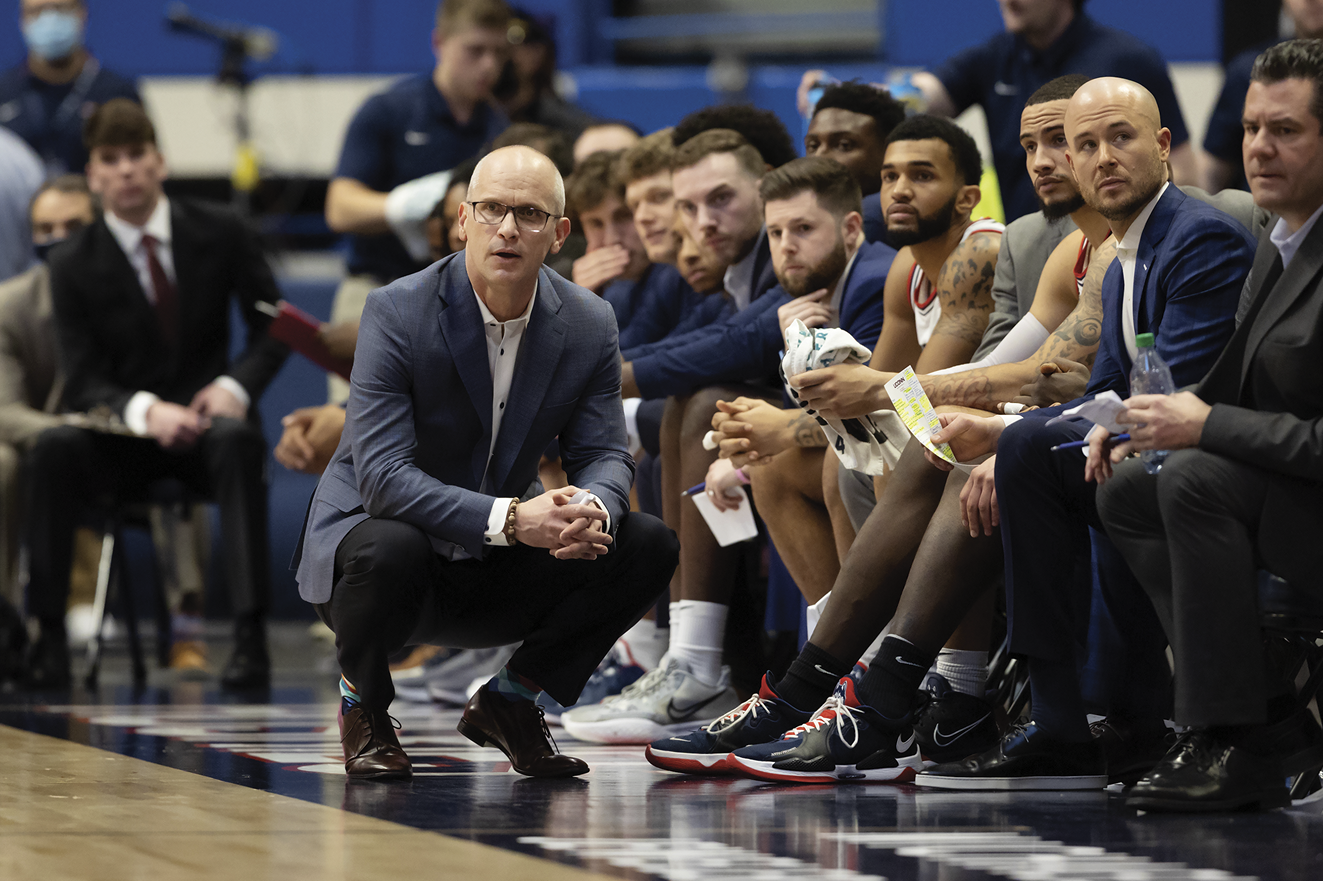
When you look at the state of college sports today, with the transfer portal and NIL deals and players entering the NBA draft after one year, is it harder for a program to build a culture?
It definitely is, and it can be tempting to take shortcuts but, in the end, that weakens your culture, or you end up without a true culture; you don’t have a program – you just have a team. I have no interest in being a coach in basketball if I am not part of a program that is recruiting young players, getting them on the court right away, and continuing to develop them over time. It is about building a bond between you and them through a lot of hard work. This is what keeps me excited and coming back for more.
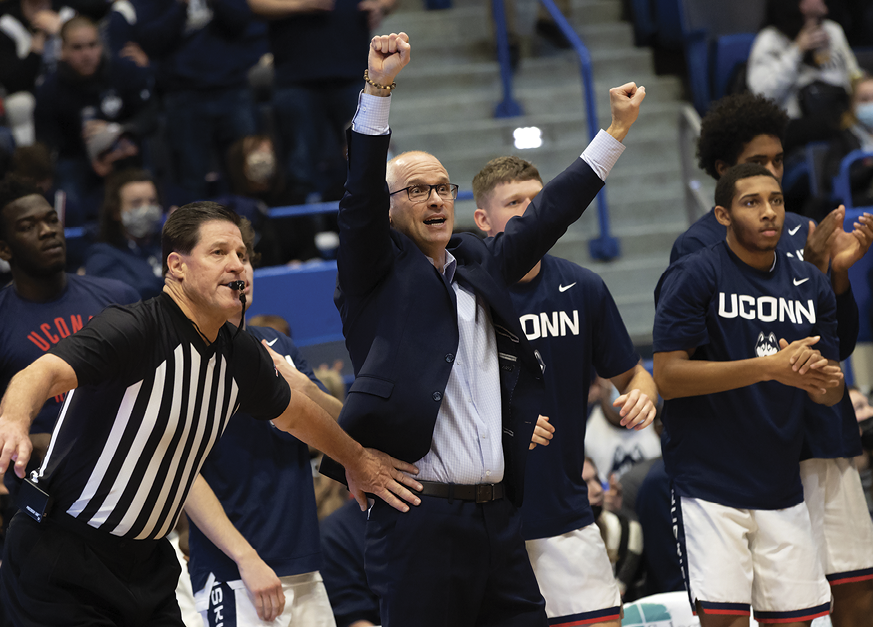
While you are always looking for the best talent, how much do you factor in personality and program fit during the recruiting process?
We look for old school parents and old school high school coaches and old school mentors around the kids we recruit. Our program is not about selling sizzle – it is about selling substance. It is about the year-round commitment that we make to our players and exhibit every day that they are on campus. Our staff is here and committed to our players – we are here around the clock for our players. We look for young people who prioritize that and for families that are looking for that type of coaching commitment.
It is about the commitment of our entire staff. I have always tried to hire the smartest people and best coaches who are focused on building relationships and creating a vision for what our program can do in terms of developing and winning. Kimani Young and Luke Murray are two of the best coaches in the country and will be incredibly successful head coaches. Tom Moore is an amazing coach to have around me. They challenge me to be my best every day and have great ideas and suggestions that have been critical to our success.
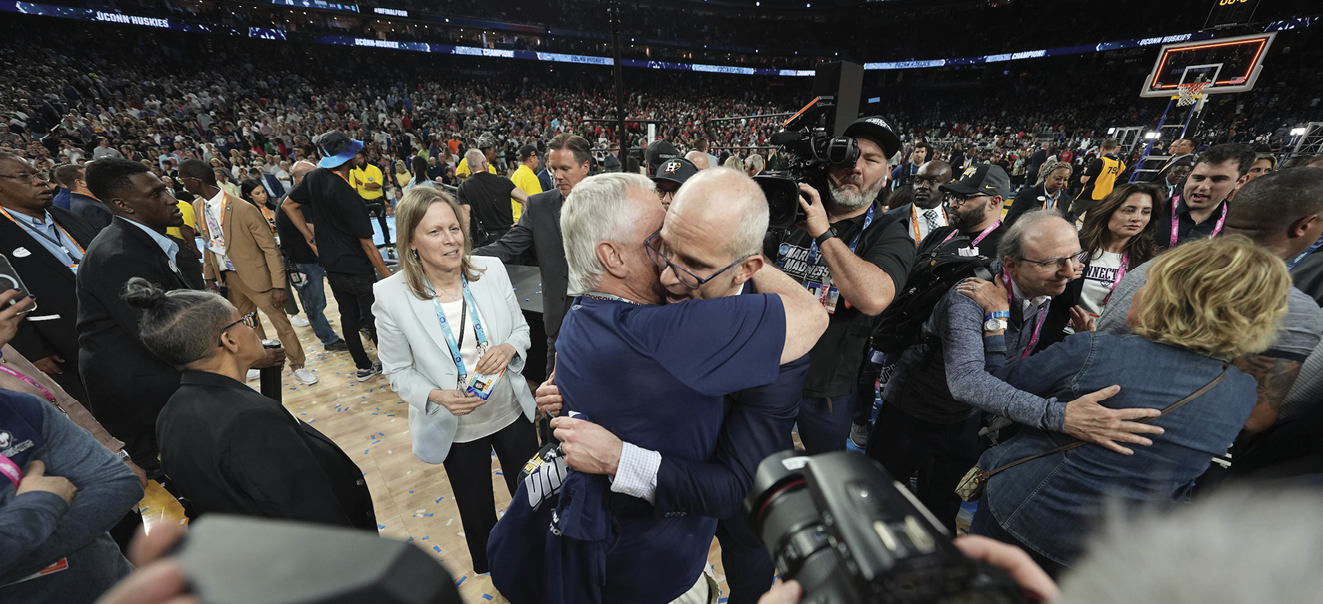
Dan Hurley celebrates with UConn class of '76 alumnus Denis Nayden
You are known to be a very passionate coach which is clear when watching you on the sidelines. Will you discuss your coaching style?
Most of that passion during a game is directed at the officials or to engage the crowd, particularly at home games since our play style – our aggression and the way we attack – lends itself to us having a very passionate bench. When you play against us, there is a special energy on our bench which is probably why we lead the country in warnings from officials for our whole bench to sit down – not just me.
What people do not see behind closed doors is the scouting work of Kimani and Luke and me; the detail of structured, high-energy, super-competitive practices; the countless hours of film work, both as a group and as individuals. We are doing this 11 months a year.
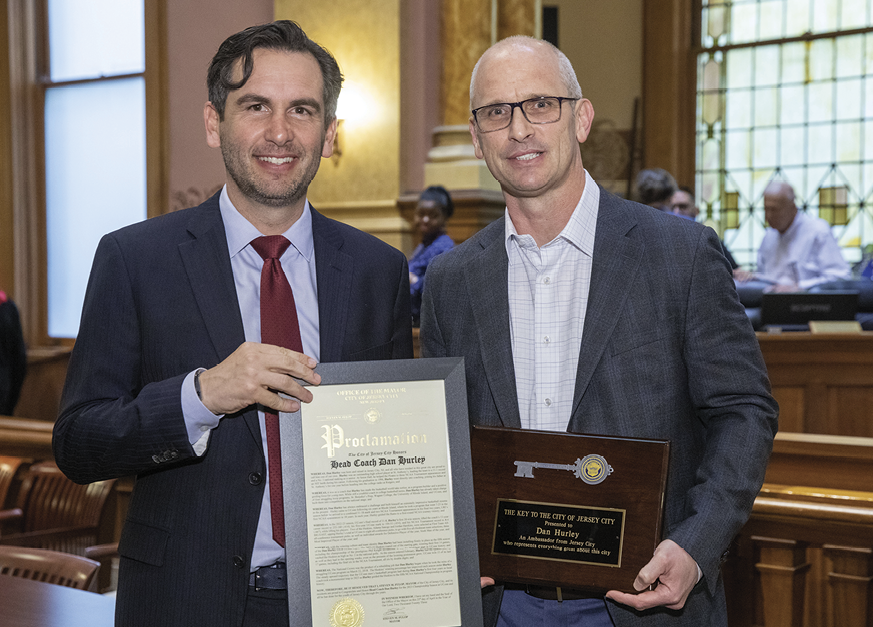
Dan Hurley receiving the Key to the City from
Jersey City, New Jersey Mayor Steven Fulop
What are your views on the state of college basketball today?
I think that the NIL was much needed for these student-athletes who bring so much value to college basketball and it provides a great opportunity for them to begin to think like businesspeople and entrepreneurs.
With regard to the transfer portal, I think we need some guardrails. For players to play for four or five different colleges allows for a lot of freedom in the short term but, in the long term, I think it unfortunately allows young people to run from ever really addressing the things that they need to do to be successful – the habits and behaviors and mentality needed to succeed. I think the transfer portal today also hurts an athlete’s ability to develop a network. If you play at three or four schools, you do not have a network in terms of a university and a coaching staff that you were with for three or four years. These networks are critical in creating opportunities for players in life after basketball.
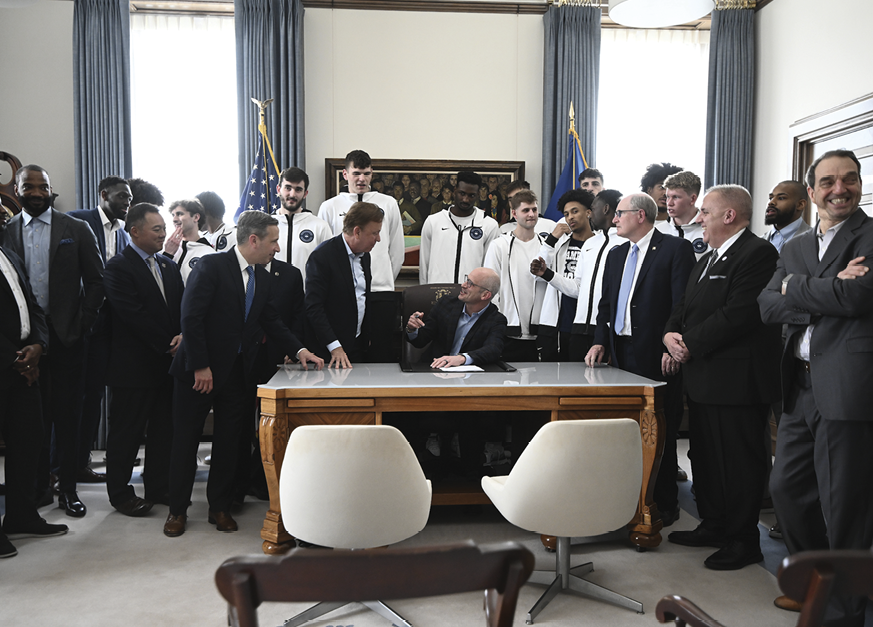
Dan Hurley and the UConn men’s basketball team
celebrating their 2023 NCAA Championship at the
Connecticut State House (above and below)
How important is it for you to build a strong alumni network for the program and to stay engaged in your players’ lives after they leave the university?
Being someone who the players respect and who they know will tell them the truth and care for them is extremely important to me. I believe in radical honesty and telling them what they need to do to improve and get better. I am also there for them when they need to be picked up or need a hug during the tough times. We develop a bond that is there throughout the rest of their lives, and it is about being there to always tell them the truth, give them advice, and care about them.
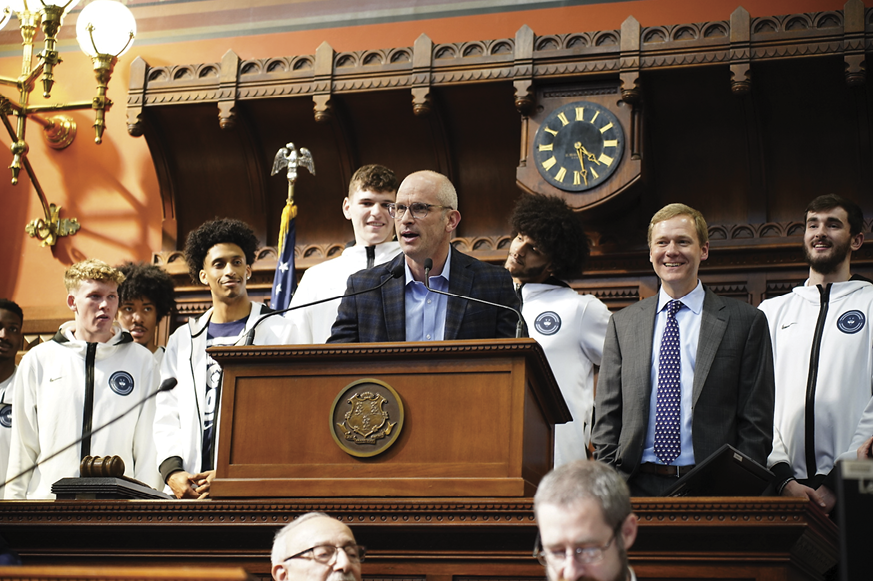
How hard is it when you are with your father and brother to not talk about basketball?
No one has ever asked me that. It is really hard. It is usually about sports and family since this is where our interests are. For us, it is all about family, close friends, and sports.
With the success that you have achieved, are you able to enjoy the process and appreciate the journey?
I prefer the process over the destination. I grew up in an incredibly high-achieving, striving household which always had me thinking about the next thing. My staff and I have been talking about next year’s roster since last February. There are times when I take moments to enjoy it, such as when I am in my truck heading home and I see a nice sunset and I think about what we just accomplished, but for the most part I am about the work and experiencing it with a group of people – which is a beautiful moment.![]()